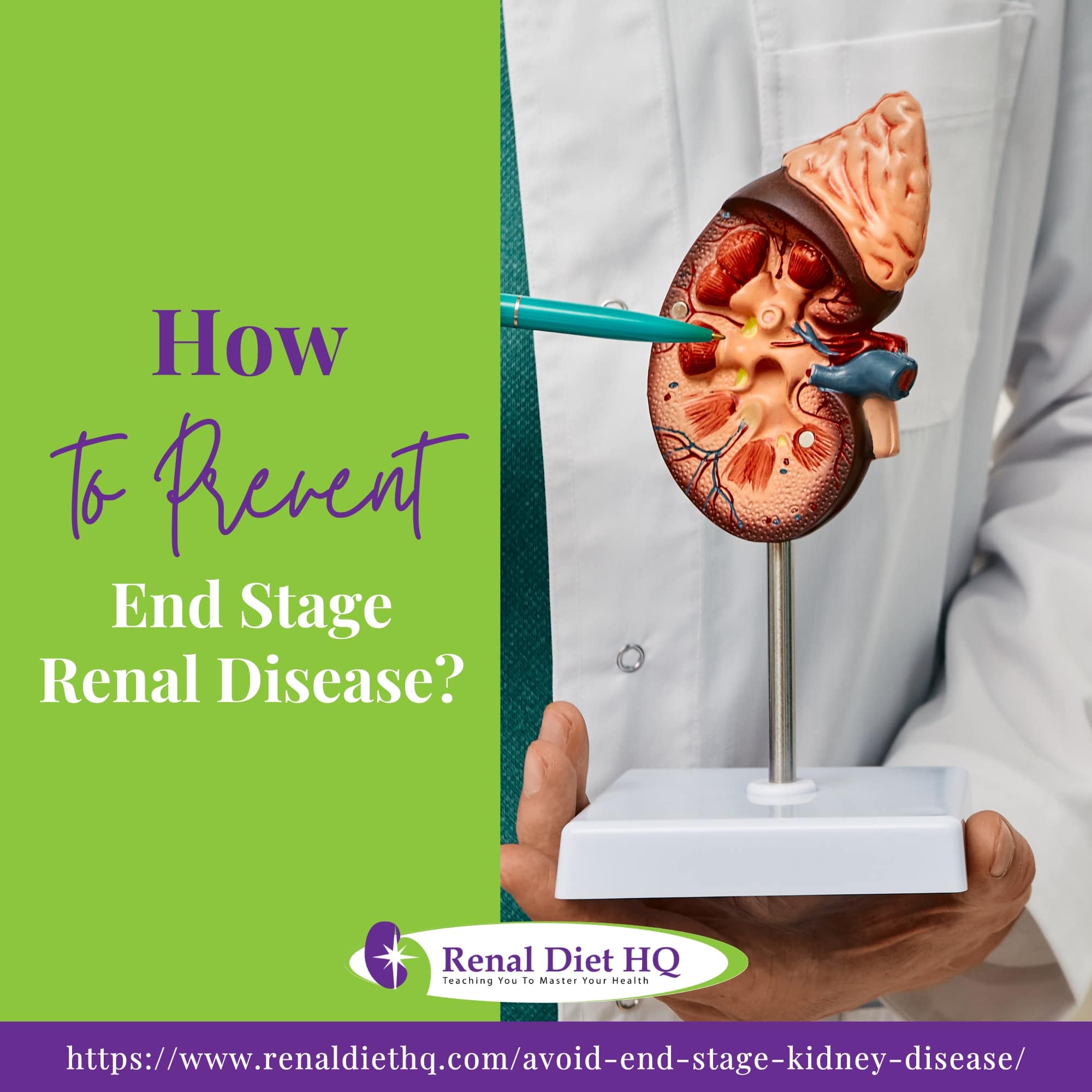How to Prevent End Stage Renal Disease
In the world of chronic health conditions, there are things you can do to make life a little easier for yourself. Most of it is following your kidney doctor's orders, so you can start to feel better.
With chronic kidney disease, however, you can actually do more than just feel better. You can actually avoid end stage kidney disease, prolonging your very life.

Jump to:
- Key Takeaways
- Understanding CKD and ESRD
- Implementing Therapeutic Interventions
- Benefits of ACE-I and ARB
- Prioritizing Glycemic Control
- Lifestyle Modifications for Kidney Health
- Adherence to Medical Advice
- Adopting a Kidney-Friendly Diet
- Educating Yourself About Kidney Disease
- Recognizing the Risks of Noncompliance
- Embracing Positive Health Changes
- Frequently Asked Questions
- CKD Shouldn’t Always End With ESRD
Key Takeaways
- Regular monitoring of kidney function and adherence to prescribed medications are crucial in managing CKD and preventing progression to ESRD.
- Good glycemic control is important to avoid or delay diabetic nephropathy, which is a leading cause of ESRD.
- Lifestyle modifications such as restricted protein intake, cessation of cigarette smoking, and maintaining a healthy lifestyle can help prevent the progression of chronic nephropathy and preserve kidney function.
- Following doctors' orders and maintaining a kidney-friendly diet can prolong life, halt the progression of the disease, and improve overall well-being and quality of life.
For More Recipes and Ideas --->> Get Your Free Meals and Recipes That Are Perfect for Pre-Dialysis Diets, Pre-Dialysis with Diabetes, or Dialysis Diets.
Understanding CKD and ESRD
Understanding Chronic Kidney Disease (CKD) and End-Stage Renal Disease (ESRD) hinges on comprehending CKD's progressive stages and distinguishing CKD from the advanced stage, ESRD. CKD advances through stages based on kidney function decline, while ESRD represents total kidney failure requiring dialysis or transplantation.
Preventing CKD progression to ESRD is pivotal, as ESRD necessitates life-sustaining interventions. Early CKD intervention prevents complications and improves outcomes, emphasizing the importance of halting CKD's advance to ESRD.
CKD vs ESRD and the CKD Stages
Chronic Kidney Disease progresses through stages, indicating varying degrees of kidney function decline. Earlier stages from Stage 1 involves mild kidney damage with normal function, while Stage 5 signifies kidney failure. End-Stage Renal Disease represents the final stage of CKD, where kidneys function at less than 15% capacity, necessitating dialysis or transplantation for survival.
Unlike CKD stages 1-4, ESRD requires immediate life-sustaining interventions due to complete kidney failure. Each CKD stage marks a gradual decline in kidney function, leading to accumulating complications, such as high blood pressure, anemia, bone disease, and cardiovascular issues.
Understanding these stages of kidney disease aids in early detection, intervention, and management, crucial for slowing CKD progression and preventing the onset of ESRD. Timely interventions, including lifestyle modifications, medication, and close medical supervision, are vital in halting CKD advancement to ESRD, thereby improving patient outcomes and quality of life.
ESRD Prevention
Preventing Chronic Kidney Disease progression to End-Stage Renal Disease is vital due to the significant impact on health, quality of life, and healthcare resources. ESRD requires life-sustaining interventions like dialysis or kidney transplant, imposing substantial physical, emotional, and financial burdens on individuals and healthcare systems.
CKD's advance to ESRD significantly elevates the risk of complications, including cardiovascular disease, anemia, bone disorders, and increased mortality rates. Moreover, ESRD demands continuous and often lifelong medical care, straining healthcare resources and impacting patients' productivity and well-being.
Preventing CKD progression through early detection, intervention, and managing risk factors like diabetes and hypertension is crucial. Timely treatments, lifestyle modifications, and addressing underlying causes of kidney damage are essential in averting the substantial healthcare, economic, and personal burdens associated with ESRD, improving both individual and societal outcomes.

Implementing Therapeutic Interventions
As you manage your kidney health, adhering strictly to prescribed medications is paramount. These include renoprotective agents like ACE inhibitors and angiotensin receptor blockers.
Simultaneously, implementing lifestyle changes can significantly mitigate the progression of chronic kidney disease. Dietary modification and exercise are two important aspects of these changes.
Medication Adherence Importance
Adherence to prescribed medications crucially safeguards renal function and impedes Chronic Kidney Disease progression to End-Stage Renal Disease.
Medications targeting underlying conditions like high blood pressure, diabetes, or specific kidney-related ailments help mitigate damage, slow kidney decline, and manage complications, preserving kidney function. Consistent medication adherence maintains optimal blood pressure, glucose levels, and mitigates inflammation, reducing stress on the kidneys and preventing further damage.
Failure to adhere to prescribed medications elevates the risk of uncontrolled hypertension, worsening diabetes, or exacerbating kidney-related issues, hastening CKD progression. By ensuring compliance with prescribed medications, individuals enhance their ability to manage CKD's underlying causes, effectively delaying or preventing the advancement to ESRD, ultimately improving long-term kidney health and overall well-being.
Lifestyle Changes Impact
Consistently applying lifestyle changes is crucial as you integrate therapeutic interventions to prevent the progression to end stage renal disease. Lifestyle modification, including dietary restrictions and regular exercise, offers substantial benefits. Adopting a kidney-friendly diet reduces the strain on your renal system, while the cardiovascular improvements from exercise enhance overall health and kidney function.
Medication adherence is non-negotiable; it ensures the efficacy of renoprotective agents, such as ACE inhibitors or angiotensin II receptor blockers. These agents, alongside vigilant glycemic control in diabetic patients, form a multifaceted approach to preserving kidney health.
Benefits of ACE-I and ARB
You'll find that ACE inhibitors (ACE-I) and angiotensin II receptor blockers (ARB) play a pivotal role in preserving renal function.
These medications effectively reduce proteinuria, which is a critical factor in preventing kidney disease progression.
Renal Function Preservation
ACE inhibitors and Angiotensin II Receptor Blockers (ARBs) are medications known for their renal protective effects in Chronic Kidney Disease (CKD). They function by blocking or inhibiting the renin-angiotensin-aldosterone system, crucial in regulating blood pressure and kidney function.
These medications dilate blood vessels, reducing pressure within the kidneys' filtering units (glomeruli), thereby decreasing stress on the kidneys. By relaxing blood vessels and lowering blood pressure, ACE inhibitors and ARBs mitigate damage to the kidneys' delicate structures, slowing the progression of CKD.
They also aid in reducing proteinuria, a common marker of kidney damage, by lessening the leakage of protein into urine. Consequently, these medications play a vital role in preserving renal function, particularly in individuals with hypertension, diabetes, or proteinuria, contributing to a slower decline in kidney function and potentially delaying the onset of End-Stage Renal Disease (ESRD).
Proteinuria Reduction Benefits
Reducing proteinuria, a key marker of kidney damage, is one of the significant benefits you'll experience from taking ACE inhibitors (ACE-I) and angiotensin II receptor blockers (ARBs). These renoprotective medications are cornerstone therapies in proteinuria management, and they play a pivotal role in blood pressure control.
As you integrate these drugs into your regimen, alongside lifestyle interventions and diabetes prevention strategies, you'll be actively combatting the progression of chronic kidney disease.
| Benefit | ACE-I | ARB |
| Proteinuria Reduction | Significant | Significant |
| Blood Pressure Control | Effective | Effective |
| Diabetes Prevention | Supportive Role | Supportive Role |
| Complement to Lifestyle Interventions | Synergistic Effects | Synergistic Effects |
Prioritizing Glycemic Control
You must recognize the critical role of diabetes management in preventing end stage renal disease.
Consistently monitoring your blood sugar levels through blood tests and other measures is key to mitigating the risk of diabetic nephropathy, which can lead to kidney failure.
Diabetes Management Importance
Effective diabetes management significantly reduces the risk of End-Stage Renal Disease development. Diabetes is a leading cause of Chronic Kidney Disease, with uncontrolled blood sugar levels damaging the kidneys over time.
Proper diabetes management, including glycemic control through medication, diet, and lifestyle adjustments, helps mitigate kidney damage by reducing the risk of diabetic nephropathy. Controlling blood glucose levels prevents or slows the progression of kidney disease in diabetic individuals.
It minimizes the strain on the kidneys, preserving their function and delaying the onset of CKD. By managing diabetes effectively, individuals can significantly lower the risk of developing ESRD, emphasizing the pivotal role of diabetes control in averting the complications and burdens associated with advanced kidney disease.
Regular monitoring, adherence to treatment plans, and lifestyle modifications are crucial in mitigating the progression from diabetes-related CKD to ESRD.
Blood Sugar Monitoring Benefits
Monitoring blood sugar levels plays a pivotal role in diabetes management, significantly impacting Chronic Kidney Disease progression. Regular blood sugar monitoring enables individuals to maintain optimal glycemic control, crucial in mitigating kidney damage.
Tighter control of blood glucose levels helps prevent or delay the onset and progression of diabetic nephropathy, a common cause of CKD. Consistent monitoring allows for timely adjustments in medication, diet, and lifestyle, aiding in stabilizing blood sugar levels and reducing the risk of kidney complications.
By closely monitoring blood sugar, individuals can detect fluctuations, assess the effectiveness of diabetes management strategies, and promptly intervene to prevent kidney damage.
Effective blood sugar control not only benefits overall diabetes management but also substantially lowers the risk of CKD progression, underscoring the critical role of blood sugar monitoring in preserving kidney health and averting the complications associated with advanced kidney disease.
Lifestyle Modifications for Kidney Health
You must understand the critical role dietary choices play in maintaining kidney health. A restricted protein intake can significantly slow the progression of chronic nephropathy.
Incorporating regular exercise into your routine also has a profound impact on renal function. It promotes overall cardiovascular health and aids in blood pressure management.
These lifestyle modifications aren't mere suggestions. They're essential, evidence-based strategies for preventing the onset of end-stage renal disease.
Diet Restriction Benefits
Diet control plays a pivotal role in preventing progression to End-Stage Renal Disease by managing underlying conditions like diabetes and hypertension, key contributors to Chronic Kidney Disease. A kidney-friendly diet, low in sodium, phosphorus, and potassium, helps alleviate stress on the kidneys, minimizing complications and slowing CKD progression.
It aids in controlling blood pressure, reducing the risk of hypertension-related kidney damage. Additionally, a balanced diet supports glycemic control in diabetes, mitigating diabetic nephropathy and its impact on kidney function. By limiting protein intake, individuals can alleviate the strain on the kidneys, potentially delaying CKD advancement.
Overall, dietary control, including portion management and nutrient moderation, assists in preserving kidney function, mitigating complications, and significantly reducing the risk of CKD progression to ESRD, underscoring the critical role of diet in maintaining kidney health.
Exercise Impact Kidneys
Incorporating regular exercise into your routine is a cornerstone of maintaining kidney health and staving off the progression to end stage renal disease. Exercise benefits renal function by improving blood pressure control, enhancing glucose metabolism, and reducing the risk factors associated with chronic kidney disease.
Adhering to physical activity recommendations can have a pronounced impact on exercise and kidney health, particularly by mitigating inflammation and oxidative stress, which are detrimental to renal tissues.
For those with CKD, exercise guidelines for kidney disease emphasize moderation and gradual progression. The impact of exercise on renal function is generally positive, but it's essential to tailor activities to your capabilities and health status.
Consult your health care provider to develop an exercise plan that supports your kidney health while accommodating your individual needs.
Adherence to Medical Advice
You must rigorously follow medical guidance to stave off end stage renal disease.
Non-adherence to prescribed therapies, including ACE inhibitors, angiotensin II receptor blockers, and specific dietary recommendations, can accelerate kidney decline.
The consequences of disregarding professional advice range from heightened morbidity to increased mortality risks.
Importance of Compliance
Compliance with prescribed medications and adherence to medical advice are paramount in halting Chronic Kidney Disease progression. Consistent medication intake, particularly for managing underlying conditions like hypertension and diabetes, significantly mitigates kidney damage.
Following prescribed treatment plans, including regular check-ups, monitoring, and lifestyle modifications, helps control risk factors contributing to CKD advancement. Adherence to medical advice regarding diet, exercise, and medication regimens optimizes blood pressure, blood sugar levels, and overall kidney health.
Failure to adhere to medications or neglecting medical guidance heightens the risk of complications, hastening CKD progression. By complying with prescribed treatments and diligently following medical advice, individuals can effectively manage CKD, slow its advancement, and potentially prevent the development of End-Stage Renal Disease, emphasizing the critical role of patient compliance in preserving kidney function and overall health.
Consequences of Non-adherence
Ignoring your doctor's advice can accelerate kidney damage, leading directly to end stage renal disease. The consequences of non-adherence extend beyond personal health to impact the entire healthcare system.
Noncompliance health consequences are severe; they include increased risks of hospitalization, reduced quality of life, and higher mortality rates. It's imperative to understand the importance of medication adherence, as it's closely linked to better outcomes and slowing disease progression.
Embracing positive health changes requires a commitment to following medical advice. Here's a breakdown of the risks and benefits:
| Aspect | Noncompliance Risks | Positive Change Benefits |
| Medication Adherence | Worsening symptoms | Stabilized kidney function |
| Lifestyle Adjustments | Accelerated disease course | Delayed progression to ESRD |
| Health System Impact | Increased treatment costs | Improved overall health |
Adhering to medical advice isn't just about avoiding risks—it's about actively pursuing a healthier future.
Adopting a Kidney-Friendly Diet
You must recognize that your dietary choices directly influence renal function and the progression of kidney disease.
It's imperative to avoid foods high in sodium, potassium, and phosphorus, which can exacerbate kidney strain and damage.
Diet's Impact Kidneys
A renal diet, tailored for individuals with Chronic Kidney Disease, focuses on managing nutrient intake to alleviate stress on the kidneys and prevent disease progression. It typically involves controlling protein, phosphorus, potassium, sodium, and fluid intake.
Limiting protein reduces the kidneys' workload, while controlling phosphorus and potassium levels helps prevent imbalances that can harm kidneys. Managing sodium intake aids in controlling blood pressure and fluid retention. By adhering to a renal diet, individuals mitigate complications, such as high blood pressure and fluid buildup, delaying CKD advancement.
This special diet supports overall kidney function, potentially slowing the decline in renal health and reducing the risk of CKD progressing to kidney failure. Proper adherence to a renal diet, combined with medical supervision and lifestyle modifications, significantly contributes to preserving kidney function and improving overall well-being.
Foods to Avoid
In a renal diet, individuals typically avoid high-potassium foods like bananas, oranges, and potatoes, as excessive potassium can burden weakened kidneys. Foods high in phosphorus, such as dairy products, nuts, and colas, are restricted to prevent phosphorus buildup, which can harm kidneys.
High-sodium foods like processed snacks, canned soups, and pickles contribute to fluid retention and elevated blood pressure, often avoided to manage kidney health. Additionally, limiting high-protein sources like red meat, poultry, and certain dairy products helps ease the kidneys' workload.
Minimizing these food groups, along with adhering to portion control and specific dietary guidelines, supports kidney health and assists in slowing the progression of Chronic Kidney Disease.

Educating Yourself About Kidney Disease
To effectively combat kidney disease, you must first grasp the fundamentals of kidney function, including how your kidneys filter waste and maintain electrolyte balance.
It's crucial to access reliable health information from reputable sources, as this empowers you to make informed decisions about your care.
Stay abreast of the latest research and treatment options to actively participate in the management of your kidney health.
Understand Kidney Function Basics
You'll find it crucial to grasp the basics of how your kidneys function as part of your strategy to prevent end stage renal disease. Understanding kidney function importance is vital for renal disease prevention. Here's what you need to know:
Kidney Health Maintenance
- The kidneys filter waste and excess fluids from blood.
- They regulate blood pressure, electrolyte balance, and red blood cell production.
eGFR Significance
- eGFR (estimated Glomerular Filtration Rate) measures kidney function.
- It's used to track disease progression and guide treatment decisions.
Access Reliable Health Information
Gaining a thorough understanding of kidney disease is essential, as it empowers you to make informed decisions about your health and treatment options. It's crucial to access health information from reliable sources to ensure that you're staying informed with the most accurate and current data.
Reliable research underpins every piece of advice and guideline, providing you with the knowledge necessary to manage your condition effectively.
Seeking support from healthcare professionals and patient advocacy groups can supplement your understanding and assist you in navigating the complexities of kidney disease. Remember, being well-informed is a proactive step in preserving your renal health and potentially preventing the progression to end-stage renal disease.
Recognizing the Risks of Noncompliance
You must recognize that noncompliance with your healthcare regimen can lead to dire health consequences, including hastened progression to end stage renal disease.
Ignoring this vital aspect of your treatment plan undermines the efficacy of therapeutic interventions and jeopardizes your health.
Noncompliance Health Consequences
By not following your doctor's orders, you're significantly increasing the risk of your kidney disease progressing to end stage renal disease. The noncompliance consequences are dire and represent a failure to mitigate the non adherence risks.
Medication adherence importance can't be overstated, as each dose taken as prescribed is a step toward stabilizing your condition. Understand the health consequences of noncompliance:
Worsening kidney function
- Increased creatinine and urea levels
- Reduced glomerular filtration rate (eGFR)
Heightened risk of cardiovascular events
- Exacerbation of hypertension
- Progression of atherosclerosis
Embracing positive changes can prevent these outcomes, fostering not only your health but also the ability to serve and support others in your community.
Make your well-being a priority; your actions have the potential to inspire and guide those around you.
Importance of Regular Follow Up
Regular follow-ups with a health care provider are crucial in preserving kidney health, especially for individuals with Chronic Kidney Disease. These check-ups involve monitoring kidney function through tests like blood pressure checks, blood and urine tests, and kidney function assessments.
Such regular evaluations allow for early detection of changes in kidney function or related conditions, enabling timely interventions and adjustments to treatment plans. Healthcare providers offer guidance on medication management, lifestyle modifications, and dietary adjustments, optimizing strategies to slow CKD progression.
Consistent follow-ups ensure ongoing support, education, and personalized care, empowering individuals to actively participate in managing their kidney health. By maintaining a proactive approach with healthcare professionals, individuals can better preserve kidney function, prevent complications, and potentially delay the advancement of CKD to more severe stages.
Embracing Positive Health Changes
You must adopt healthy habits to mitigate the risk of progressing to end stage renal disease.
The benefits of lifestyle shifts, including rigorous adherence to a kidney-friendly diet and consistent exercise, are well-documented in slowing CKD.
Adopting Healthy Habits
Besides diet and exercise, several healthy habits contribute to mitigating Chronic Kidney Disease (CKD) progression. Adequate hydration promotes kidney function by supporting waste removal, diluting urine, and preventing kidney stones. Avoiding smoking and excessive alcohol consumption helps maintain overall health and reduces the risk of kidney damage.
Managing stress through relaxation techniques or mindfulness positively impacts blood pressure and overall well-being, indirectly benefiting kidney health. Monitoring and managing other health conditions like high blood pressure, diabetes, and heart disease are crucial, as these often contribute to CKD progression. Additionally, getting sufficient sleep aids in hormone regulation and overall body function, supporting kidney health indirectly.
By embracing a holistic approach that encompasses hydration, stress management, proper sleep, and managing comorbidities, individuals can complement diet and exercise efforts, potentially slowing CKD advancement and preserving kidney function.
Benefits of Lifestyle Shifts
Lifestyle modifications extend beyond preserving kidney health, offering multifaceted benefits. Adopting a healthier lifestyle, including regular exercise, balanced nutrition, and stress management, not only supports kidney function but also enhances overall well-being.
Physical activity reduces the risk of chronic diseases like heart disease, diabetes, and obesity, positively impacting cardiovascular health and reducing mortality rates. Balanced nutrition promotes optimal body function, boosts immune health, and aids in weight management, impacting energy levels and overall vitality. Stress management techniques alleviate mental strain, improving mood, cognitive function, and sleep quality.
These holistic lifestyle changes contribute to enhanced quality of life, better mental health, increased longevity, and reduced risks of various ailments beyond kidney-related complications. Embracing a healthier lifestyle offers comprehensive advantages, fostering overall health and vitality while safeguarding against numerous chronic conditions.
Frequently Asked Questions
End-Stage Renal Disease is deadly without kidney transplantation or dialysis treatments. Medical treatments and lifestyle changes can manage symptoms, slow disease progression, and improve quality of life but cannot reverse ESRD.
Lifestyle adjustments like diet control, exercise, and medication adherence aid in managing complications and delaying further decline in kidney function. While these measures are crucial in managing ESRD, they do not reverse the condition itself, necessitating ongoing medical interventions for survival.
Genetic factors influence ESRD risk, with certain gene variants predisposing individuals to kidney disease. Polycystic kidney disease (PKD), Alport syndrome, and familial nephropathies are hereditary conditions increasing ESRD risk.
While genetic factors cannot be altered, early detection through genetic testing aids in proactive management and monitoring. Lifestyle adjustments targeting risk factors like hypertension and diabetes, often associated with genetic kidney diseases, can mitigate their impact on kidney health, potentially delaying ESRD onset or progression.
Mental health significantly influences CKD management and outcomes. Depression, anxiety, and stress can exacerbate symptoms and affect treatment adherence. Integrated support systems involving mental health professionals, support groups, and counseling services are available to address emotional well-being alongside medical care.
Psychosocial interventions, therapy, and education help patients cope with CKD-related stressors, enhancing adherence to treatment plans and improving overall quality of life. Holistic care that considers mental health alongside medical management is pivotal in achieving better outcomes for individuals with CKD.
CKD Shouldn’t Always End With ESRD
Understanding CKD stages and ESRD is vital. CKD progresses through stages based on declining kidney function, while ESRD signifies complete kidney failure, requiring immediate intervention like dialysis or transplantation.
Preventing CKD from advancing to ESRD is crucial. Timely intervention, medication adherence, and managing risk factors slow CKD, avert complications, and improve outcomes.
By comprehending these stages, individuals can take proactive steps to preserve kidney function, emphasizing the significance of early detection and effective management in ensuring better kidney health and an improved quality of life.














Need diet for Renal disease